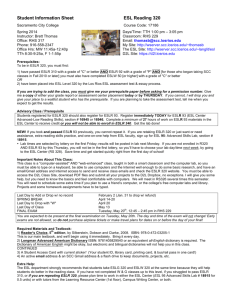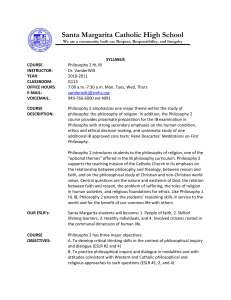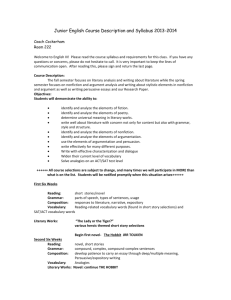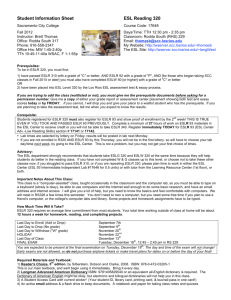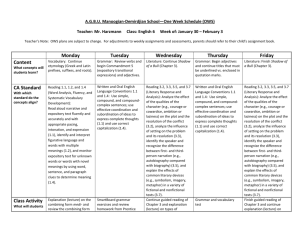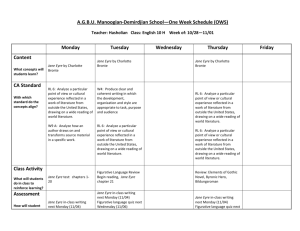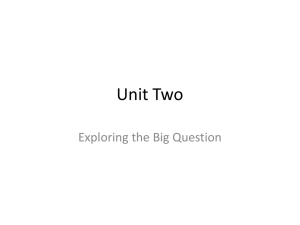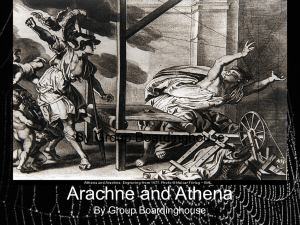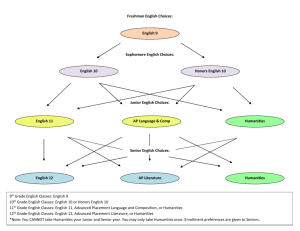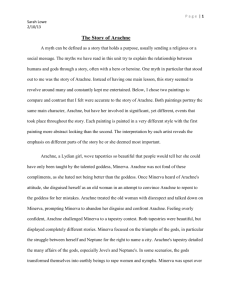AGBU Manoogian-Demirdjian School—One Week
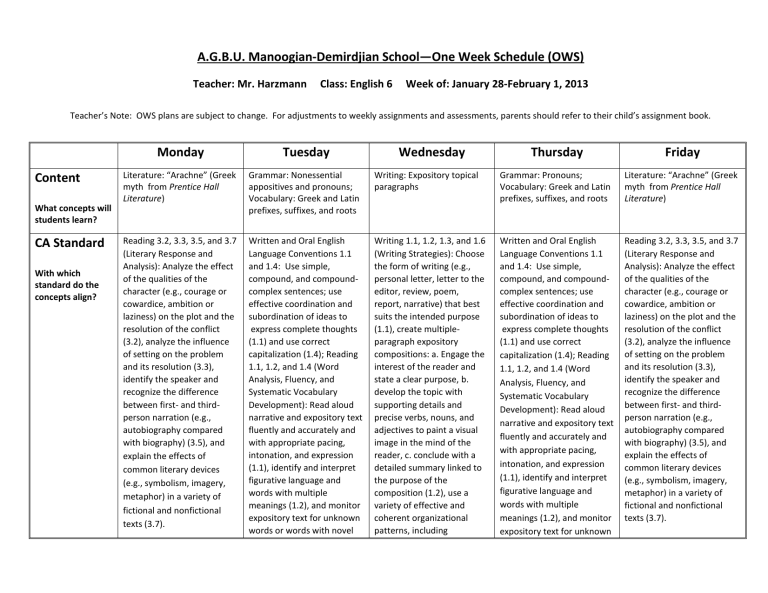
A.G.B.U. Manoogian-Demirdjian School—One Week Schedule (OWS)
Teacher: Mr. Harzmann Class: English 6 Week of: January 28-February 1, 2013
Teacher’s Note: OWS plans are subject to change. For adjustments to weekly assignments and assessments, parents should refer to their child’s assignment book.
CA Standard
With which standard do the concepts align?
Monday Tuesday
Content
What concepts will students learn?
Literature: “Arachne” (Greek myth from Prentice Hall
Literature)
Grammar: Nonessential appositives and pronouns;
Vocabulary: Greek and Latin prefixes, suffixes, and roots
Wednesday
Writing: Expository topical paragraphs
Reading 3.2, 3.3, 3.5, and 3.7
(Literary Response and
Analysis): Analyze the effect of the qualities of the character (e.g., courage or cowardice, ambition or laziness) on the plot and the resolution of the conflict
(3.2), analyze the influence of setting on the problem and its resolution (3.3), identify the speaker and recognize the difference between first- and thirdperson narration (e.g., autobiography compared with biography) (3.5), and explain the effects of common literary devices
(e.g., symbolism, imagery, metaphor) in a variety of fictional and nonfictional texts (3.7).
Written and Oral English
Language Conventions 1.1 and 1.4: Use simple, compound, and compound- complex sentences; use effective coordination and subordination of ideas to
express complete thoughts
(1.1) and use correct capitalization (1.4); Reading
1.1, 1.2, and 1.4 (Word
Analysis, Fluency, and
Systematic Vocabulary
Development): Read aloud narrative and expository text fluently and accurately and with appropriate pacing, intonation, and expression
(1.1), identify and interpret figurative language and words with multiple meanings (1.2), and monitor expository text for unknown words or words with novel
Writing 1.1, 1.2, 1.3, and 1.6
(Writing Strategies): Choose the form of writing (e.g., personal letter, letter to the editor, review, poem, report, narrative) that best suits the intended purpose
(1.1), create multiple- paragraph expository compositions: a. Engage the interest of the reader and state a clear purpose, b. develop the topic with supporting details and precise verbs, nouns, and adjectives to paint a visual image in the mind of the reader, c. conclude with a detailed summary linked to the purpose of the composition (1.2), use a variety of effective and coherent organizational patterns, including
Thursday Friday
Grammar: Pronouns;
Vocabulary: Greek and Latin prefixes, suffixes, and roots
Literature: “Arachne” (Greek myth from Prentice Hall
Literature)
Written and Oral English
Language Conventions 1.1 and 1.4: Use simple, compound, and compound- complex sentences; use effective coordination and subordination of ideas to
express complete thoughts
(1.1) and use correct capitalization (1.4); Reading
1.1, 1.2, and 1.4 (Word
Analysis, Fluency, and
Systematic Vocabulary
Development): Read aloud narrative and expository text fluently and accurately and with appropriate pacing, intonation, and expression
(1.1), identify and interpret figurative language and words with multiple meanings (1.2), and monitor expository text for unknown
Reading 3.2, 3.3, 3.5, and 3.7
(Literary Response and
Analysis): Analyze the effect of the qualities of the character (e.g., courage or cowardice, ambition or laziness) on the plot and the resolution of the conflict
(3.2), analyze the influence of setting on the problem and its resolution (3.3), identify the speaker and recognize the difference between first- and thirdperson narration (e.g., autobiography compared with biography) (3.5), and explain the effects of common literary devices
(e.g., symbolism, imagery, metaphor) in a variety of fictional and nonfictional texts (3.7).
meanings by using word, sentence, and paragraph clues to determine meaning
(1.4).
Class Activity
What will students do in class to reinforce learning?
Guided reading of “Arachne” and discussion of Review and Assess Questions #2 and
#5; begin explanation
(lecture) of literary terms concerning characters
(dynamic and static).
Reading comprehension test on “Arachne” (week of
February 4-8).
Continue explanation
(lecture) on suffixes commonly found in nouns; continue unit on pronouns; grammar quiz on commas; continue explanation
(lecture) on the Latin suffix
ante-;
Grammar quiz on commas; vocabulary test (week of
February 11-15)
Assessment
How will student learning be gauged?
Homework
What should students do at home?
Which
ESLR(s)?
Define (including part of speech) prescribed vocabulary words from
“Arachne.”
ESLR I: Become academically capable individuals are prepared to meet the rigors of higher education and have the ability to implement technology in all facets of their education;
ESLR II: Become skilled learners and independent thinkers who are able to apply critical thinking skills comparison and contrast; organization by categories; and arrangement by spatial order, order of importance, or climactic order (1.3), and revise writing to improve the organization and consistency of ideas within words or words with novel meanings by using word, sentence, and paragraph clues to determine meaning
(1.4).
and between paragraphs
(1.6).
Writing Prompt (topic TBD) Continue unit on pronouns; continue explanation
(lecture) on the Latin prefix
ante-; review the Greek combining form cardio-.
Proofreading of Writing
Prompt
Vocabulary test (week of
February 11-15)
Continue discussion of
Review and Assess Questions
#2 and #5; review prescribed vocabulary words from
“Arachne.”
Reading comprehension test on “Arachne” (week of
February 4-8).
Preparation for grammar quiz on commas; exercises from Prentice Hall Writing and Grammar: Grammar
Exercise Workbook;
Vocabulary Scavenger Hunt
ESLR I: Become academically capable individuals who have acquired a strong knowledge base in all disciplines offered at the school; ESLR II: Become skilled learners and independent thinkers who demonstrate effective communication skills through verbal, written,
Review Comma
Commandment 4 and
Comma Commandment 5
ESLR I: Become academically capable individuals are prepared to meet the rigors of higher education and have the ability to implement technology in all facets of their education;
ESLR II: Become skilled learners and independent thinkers who are competent in analyzing and synthesizing
Pronoun Scavenger Hunt; preparation for upcoming vocabulary test
Preparation for upcoming reading comprehension test
ESLR I: Become academically capable individuals who have acquired a strong knowledge base in all disciplines offered at the school; ESLR II: Become skilled learners and independent thinkers who demonstrate effective communication skills through verbal, written,
ESLR I: Become academically capable individuals are prepared to meet the rigors of higher education and have the ability to implement technology in all facets of their education; ESLR II:
Become skilled learners and independent thinkers who are able to apply critical thinking skills and problem-
and problem-solving in school and real-life situations and have developed effective study habits and self-discipline. artistic, and technological modes of expression information from multiple sources and demonstrate effective communication skills through verbal, written, artistic, and technological modes of expression; ESLR
IV: Become socially developed and productive future citizens who demonstrate healthy competitiveness and collaborative work habits. artistic, and technological modes of expression solving in school and real-life situations and have developed effective study habits and self-discipline.
